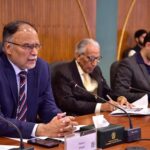UNITED NATIONS, Jun 12 (APP):United Nations Secretary-General Antonio Guterres has presented a set of recommendations for the international community to help ensure all people are connected, respected, and protected in the digital age, especially when digital technology is vital in combating the coronavirus pandemic.
“Far from distracting us from the urgency of digital cooperation, COVID-19 is making it more important than ever, and demonstrating the interconnected nature of the challenges we face”, he told Thursday’s “High-level Thematic Debate on the Impact of Rapid Technological Change on the Sustainable Development Goals (SDGs) and Targets”, taking place in the UN General Assembly.
Noting that digital technology is central to almost every aspect of effective pandemic response – including vaccine research, online learning models, e-commerce, and work-from-home tools – he pointed out that the digital divide between those on and offline, is threatening to become “the new face of inequality”, reinforcing the social and economic disadvantages suffered by women and girls, people with disabilities and “minorities of all kinds”.
Guterres told the meeting that we are only beginning to understand the social implications of a post-COVID world.
“To fully reap its benefits and contain potential harms we must ensure the digital age is defined by increased international cooperation,” he said.
“There are no borders in cyberspace. Today I call on all UN member states and our partners in industry and civil society to expand cooperation on digital technology issues. Only by working together can we connect all people by 2030, respect human rights online, and protect the most vulnerable from the potential perils of the digital age,” said the UN chief.
The secretary-general’s Roadmap for Digital Cooperation is the result of a multi-year, multi-stakeholder, global effort to address a range of issues related to the internet, artificial intelligence, and other digital technologies, according to a press release.
The Roadmap for Digital Cooperation comes at a critical inflection point for digital issues, with the COVID-19 pandemic accelerating digitization and magnifying both opportunities and challenges of digital technology.
Nearly half of the global population, 46.4 percent according to the International Telecommunication Union, cannot connect to the internet and remain unable to fully participate in the digital age. Women are disproportionately affected with only 48 percent connected globally. Meanwhile, as efforts to connect more people proceed, new vulnerabilities have arisen. Cyberattacks and misinformation threaten human rights, privacy, and security.
Opening the General Assembly meeting, President of the 193-member body, Tijjani Muhammad-Bande, acknowledged that the COVID-19 pandemic has forced everyone to “change the way we work, teach and learn; even the way we mourn and heal”.
According to Muhammad-Bande, the digital divide is not only about how inequalities to access exist, but also about how rapid technological change may actually widen those disparities.
“Educational opportunities may be lost by lack of awareness and high cost of connectivity”, he elaborated, adding that digital literacy, “already a defining feature of this century”, will determine how societies deal with future challenges, from human rights to the climate crisis (SDG13) – encompassing a sweeping range of SDGs.
The Assembly president said, “the need to eradicate poverty [SDG1], end hunger [SDG2] and achieve quality education for all [SDG4] is more urgent than ever.”
Against this backdrop, he maintained that it is the responsibility of the international community to make sure that “rapid technological changes, including their economic, social and ethical impacts, are taken into account and responded to”.
The Assembly President also underscored the need to step up the pace to remove barriers to women’s and girl’s full participation in the digital world (SDG5), reiterating that “limited access to quality education, and affordability, as well as cultural norms, still prevent many from entering such fields”.
And pointing out that 2020 marks the beginning of the Decade of Action and Delivery on the SDGs, he said, “we must be mindful not to lose sight of the commitments we have made to achieve the 2030 Agenda for Sustainable Development”.
“We must make sure that we harness the promise of emerging technologies towards accelerating the achievement of the SDGs”, the Assembly chief added.






